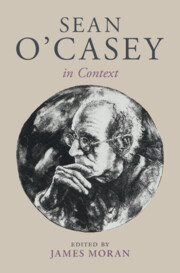Book contents
- Sean O’Casey in Context
- Sean O’Casey in Context
- Copyright page
- Contents
- Figures
- Tables
- Contributors
- Acknowledgements
- Sean O’Casey’s Life and Times: A Chronology
- Abbreviations
- Introduction
- Part I Key Places and Events
- Part II Social Contexts
- Chapter 6 Nationalism
- Chapter 7 Class
- Chapter 8 Censorship
- Chapter 9 Women
- Chapter 10 Gender and Sexuality
- Chapter 11 Disability
- Chapter 12 Race
- Chapter 13 Migration
- Chapter 14 Religion
- Chapter 15 Loss
- Part III Collaborators and Critics
- Part IV Performance Legacies
- Part V Non-Theatrical Writings
- Part VI Critical Understandings
- Further Reading
- Index
Chapter 12 - Race
from Part II - Social Contexts
Published online by Cambridge University Press: 23 June 2025
- Sean O’Casey in Context
- Sean O’Casey in Context
- Copyright page
- Contents
- Figures
- Tables
- Contributors
- Acknowledgements
- Sean O’Casey’s Life and Times: A Chronology
- Abbreviations
- Introduction
- Part I Key Places and Events
- Part II Social Contexts
- Chapter 6 Nationalism
- Chapter 7 Class
- Chapter 8 Censorship
- Chapter 9 Women
- Chapter 10 Gender and Sexuality
- Chapter 11 Disability
- Chapter 12 Race
- Chapter 13 Migration
- Chapter 14 Religion
- Chapter 15 Loss
- Part III Collaborators and Critics
- Part IV Performance Legacies
- Part V Non-Theatrical Writings
- Part VI Critical Understandings
- Further Reading
- Index
Summary
In 1968, Martin Luther King gave his final major public speech, in which he praised the work of Sean O’Casey. This chapter highlights the way in which O’Casey’s work proved attractive to Black activists, pointing to the comments he made about race in his letters and autobiographies, and highlighting the way in which Black actors in New York began to perform in O’Casey’s drama in the mid-twentieth century. The chapter also draws attention to the way in which figures such as Harry Belafonte and Lorraine Hansberry felt inspired by the Dublin playwright’s work.
Keywords
Information
- Type
- Chapter
- Information
- Sean O'Casey in Context , pp. 130 - 139Publisher: Cambridge University PressPrint publication year: 2025
Accessibility standard: Inaccessible, or known limited accessibility
Why this information is here
This section outlines the accessibility features of this content - including support for screen readers, full keyboard navigation and high-contrast display options. This may not be relevant for you.Accessibility Information
Content Navigation
Allows you to navigate directly to chapters, sections, or non‐text items through a linked table of contents, reducing the need for extensive scrolling.
Provides an interactive index, letting you go straight to where a term or subject appears in the text without manual searching.
Reading Order & Textual Equivalents
You will encounter all content (including footnotes, captions, etc.) in a clear, sequential flow, making it easier to follow with assistive tools like screen readers.
Visual Accessibility
You will still understand key ideas or prompts without relying solely on colour, which is especially helpful if you have colour vision deficiencies.
